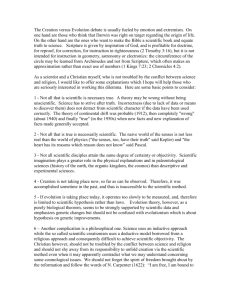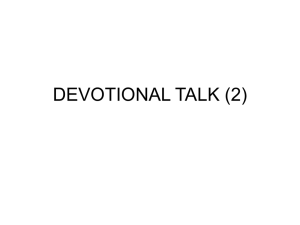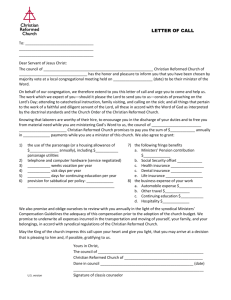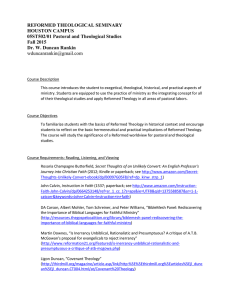S t u d
advertisement
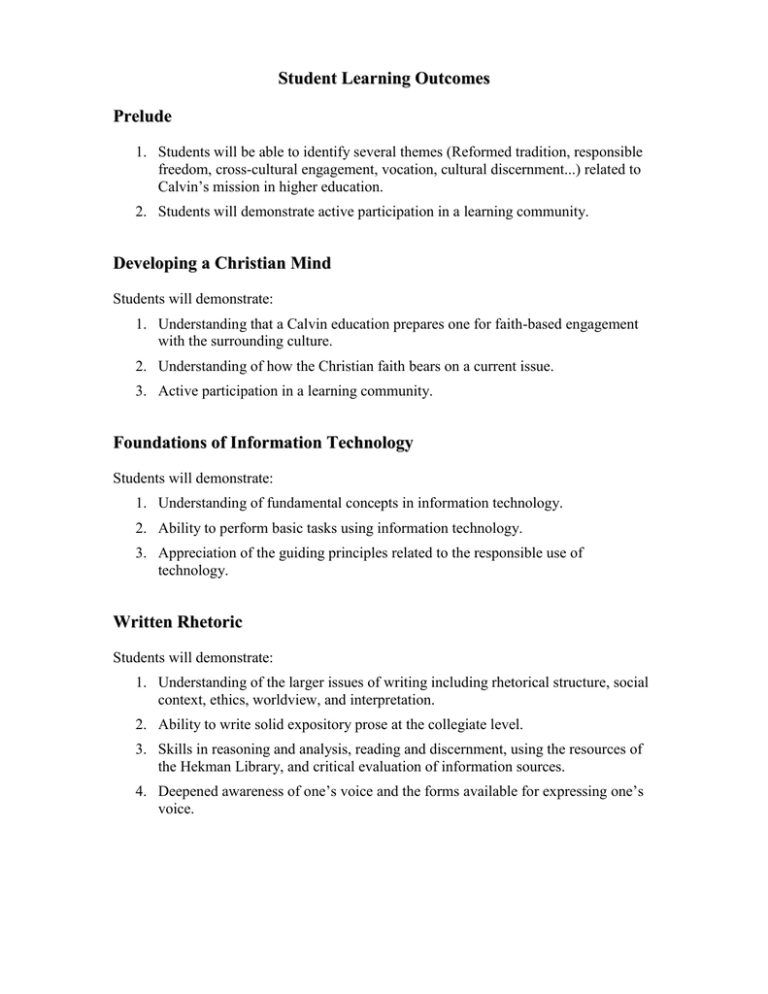
Student Learning Outcomes Prelude 1. Students will be able to identify several themes (Reformed tradition, responsible freedom, cross-cultural engagement, vocation, cultural discernment...) related to Calvin’s mission in higher education. 2. Students will demonstrate active participation in a learning community. Developing a Christian Mind Students will demonstrate: 1. Understanding that a Calvin education prepares one for faith-based engagement with the surrounding culture. 2. Understanding of how the Christian faith bears on a current issue. 3. Active participation in a learning community. Foundations of Information Technology Students will demonstrate: 1. Understanding of fundamental concepts in information technology. 2. Ability to perform basic tasks using information technology. 3. Appreciation of the guiding principles related to the responsible use of technology. Written Rhetoric Students will demonstrate: 1. Understanding of the larger issues of writing including rhetorical structure, social context, ethics, worldview, and interpretation. 2. Ability to write solid expository prose at the collegiate level. 3. Skills in reasoning and analysis, reading and discernment, using the resources of the Hekman Library, and critical evaluation of information sources. 4. Deepened awareness of one’s voice and the forms available for expressing one’s voice. Rhetoric in Culture Students will demonstrate: 1. Knowledge of basic elements of communication. 2. Effective oral and visual communication skills. 3. Skills of cultural discernment and analysis. 4. Appreciation for the virtues of honesty, creativity, and compassion. Foreign Language Students will demonstrate: 1. Competency in foreign language skills. 2. Familiarity with the host culture. 3. Empathy for the other. Health and Fitness Students will demonstrate: 1. Understanding of concepts necessary for the development of a physically active lifestyle. 2. Increased tendency to pursue healthy behaviors. 3. Proficiency in motor skills related to fitness, leisure activity, and sport and/or dance. 4. Understanding of the foundational principles needed to discern the proper place of sport, competition, play, leisure, movement, and rest. Biblical Foundations I Students will demonstrate: 1. Understanding of central theological themes of the Bible. 2. Understanding of historical, cultural context and literary features of the various sections of the Bible. 3. Skills in reading scripture, thinking critically, and writing coherently at an introductory level. 4. Enhanced understanding of the nature and authority of scripture within the Reformed tradition. Biblical Foundations II Students will demonstrate: 1. Understanding of central theological themes of a portion of scripture. 2. Enhanced in-depth analysis of the historical, cultural context and literary features of a portion of scripture. 3. Skills in reading scripture, thinking critically, and writing coherently at an intermediate level. 4. Enhanced understanding of the nature and authority of scripture within the Reformed tradition. Theological Foundations I Students will demonstrate: 1. Understanding of central teachings of the Christian church. 2. Understanding of the development of Christian theology through history, from a Reformed perspective 3. Skills in reading theological texts, thinking critically, and writing coherently at an introductory level. Theological Foundations II Students will demonstrate: 1. Understanding of central teachings of the Christian church. 2. Enhanced in-depth investigation of a key Christian doctrine or historical era, from a Reformed perspective. 3. Skills in reading theological texts, thinking critically, and writing coherently at an intermediate level. History of the West and the World I, II Students will demonstrate: 1. Increased knowledge of the development of Western civilization within a global context. 2. Increased understanding of the contexts, forces, and traditions that shape the world one inhabits. 3. Increased awareness of various points of view from which to assess the contemporary world. Philosophical Foundations Students will demonstrate: 1. Understanding of basic philosophical questions and responses about God, the world, and human nature. 2. Understanding of the key parts of a Christian worldview with regard to the world and the purpose of human life. 3. Skills of philosophical analysis, cultural discernment, and expository writing. Mathematics Students will demonstrate: 1. Understanding of formal mathematical structures and their applications. 2. Appreciation of how mathematics shapes one’s understanding of reality. 3. Enhanced skills in mathematical reasoning. The Natural World Students will demonstrate: 1. Understanding the examination of physical or living systems through the methods of experimental science. 2. Preparedness for participation in a technological society. 3. Ability to reflect christianly on findings of natural science. 4. An appreciation of God’s wisdom reflected through the wonders of the natural world. Literature Students will demonstrate: 1. Knowledge of the context, structure, and function of works of literature. 2. Skills in the critical analysis of literature. 3. The ability to read and understand literature. 4. An appreciation for the discipline of reading. 5. Empathy for the other through literature. Arts Students will demonstrate: 1. Understanding of how the arts influence one’s sense of life and the world. 2. Skills of observing and listening to the arts with understanding and discernment. 3. Growth in insight and wisdom about the human condition. Persons in Community Students will demonstrate: 1. Understanding of the major dimensions of human identity. 2. A familiarity with social science methodology as it bears on understanding human identity. 3. An appreciation of humans as image-bearers of God. Societal Structures in North America Students will demonstrate: 1. Knowledge of the basic social institutions of North American society. 2. Familiarity with the central concepts, methods, and theories of the social sciences. 3. An appreciation for justice, freedom, and stewardship as societal norms. Global and Historical Studies Students will demonstrate: 1. Knowledge regarding a culture, era, or event removed from the North Atlantic context. 2. Increased understanding of global issues and of their historical roots. 3. Critical evaluation of their own culture. 4. Appreciation of a different way to see the world, its peoples, and its cultures. CCE 1. Students will demonstrate an ability to communicate effectively with members of another culture. 2. Students will demonstrate an ability to engage, understand, and appreciate another culture. 3. Students will demonstrate an ability to adapt, where appropriate, to the cultural expectations of those with whom they engage. 4. Students will demonstrate an ability to reflect thoughtfully on their own faith by understanding how faith and/or morality is embedded in another culture. Integrative Studies 1. Students will demonstrate knowledge of a Christian perspective in a particular area of inquiry and will be able to articulate the implications of this Christian perspective in a specific arena of life practice. 2. Students will demonstrate the ability to critically analyze an area of life practice or inquiry, demonstrating depth and breadth of knowledge in the particular area and a sensitivity to worldview assumptions. 3. Students will demonstrate knowledge of their own abilities, values, and callings. 4. Students will be able to express themselves clearly and succinctly in writing. 5. Students will be able to express themselves clearly and succinctly orally.

